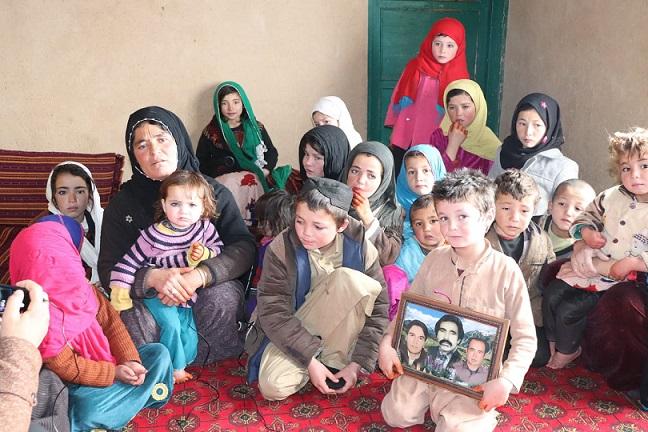FIROZKOH (Pajhwok): Twelve-years-old Ahmad Zia, who daily takes drinking water on his four donkeys to a security base in western Ghor province to feed 30 people in his family since losing his father and three uncles in the conflict, says if peace comes he will forget his bitter past and properly lead life, adding all children deserve peace.
A resident of Qatas village near Firozkoh, the provincial capital, Ahmad Zia supports his mother, grandmother, widowed wives of his three uncles, their children, his own brothers and sisters in a house with mostly primary living tools.
He is one of thousands of Afghan children who bear such huge responsibility on their small shoulders because of the four decades of war in the country.
Zia cannot go to school as he has to fulfill his daily responsibility of transferring water on the donkeys from a long distance to a base of Afghan forces.
A Pajhwok Afghan News reporter found the boy and his 30 family members. They live 12 kilometers away from the provincial capital in a muddy house of four rooms.
.jpg)
The reporter saw many children emerging from Zia’s home as his house. All of these children who wore old and torn clothes were relatives of Zia.
The reporter was guided to a cold room in Zia’s house where his grandmother, four widows and their children live.
“My four sons who were farmers and uprising members were killed in conflicts,” said the grandmother, Bibi Gul.
As one of her grandchildren was sitting on her legs, Gul sadly said, “My sons were too young when killed and their deaths changed our lives.”
She said her eldest son was killed in a rocket strike when he was returning home on October 2, 2019 and two days after his killing, her three other sons were killed at once in a roadside bombing planted by the Taliban.
The 65 years old woman, cleaning her tears with a corner of her shawl, said, that the Taliban had planted bombs in part of their village that killed her three sons and many other people of the area.
Pointing to a photo of her son in the hands of one of her grandchildren, Gul said her three sons took leave from duty for two days to collect their brother’s corpse but they were hit by a Taliban bomb and killed.
She sighed sadly and said her husband was also killed in a rocket attack 25 years ago and she was left alone looking after her four sons.
The grandmother now takes care of her orphaned grandchildren. Turning her face to Ahmad Zia, she said “He is the eldest male in the family. He works hard despite his small age to provide us food and we survive.”
“When my father and uncles died I cried a lot. My mother and grandmother told me you are now our breadwinner.”
Ahmad Zia, who has four donkeys, travels four kilometers to bring drinking water for security forces stationed in their area against 4,000 afghanis per month.
The 12-year-old pointed to several jerry cans in a corner of the house and said: “Every day I leave home at 9am for Kotal-i-Sartarqida area and return after 1:00pm and fetch water for security forces.”
.jpg)
With his salary he bought a bag of rice, some ghee, tea, sugar and spent some money on family needs.
The women in Ahmad Zia’s family also earn some money against washing uniforms of security forces. They wash each uniform for 50 afghanis.
Zia studied until 6th class and left the school after the death of his father and uncles and has since been working to support his family.
“I like study. It was my father’s wish that I become a doctor, said Zia, who was concerned about education of other children in the family. He urged the government to pay attention to children like him who face such problems.
The 12-year-old linked all problems children face to the conflict in the country, saying: “My father and uncles are victims of this war.”
Pointing the orphaned children in the room, he said: “The fathers of all of us would have been alive if there was no conflict in the country, our desire is peace because war brings miseries and render children like us fatherless.”
Hundreds of children in districts of this province are forced into hard labor to support their families after losing fathers and uncles to the conflict.
On the banks of Harirod river, dozens of children wash cars eke out a living.
Mohibullah, 13, a resident of Kakar village in Pasaband district of Ghor, was the smallest among other labor children who were washing cars.
Mohib said he lost his father to the conflict and he must work in order to feed his family.
While washing a white-colored corolla car with his little hands, the minor said: “My father was killed during a clash between Taliban and security forces two years ago.”
mds/sa/ma









GET IN TOUCH
NEWSLETTER
SUGGEST A STORY
PAJHWOK MOBILE APP